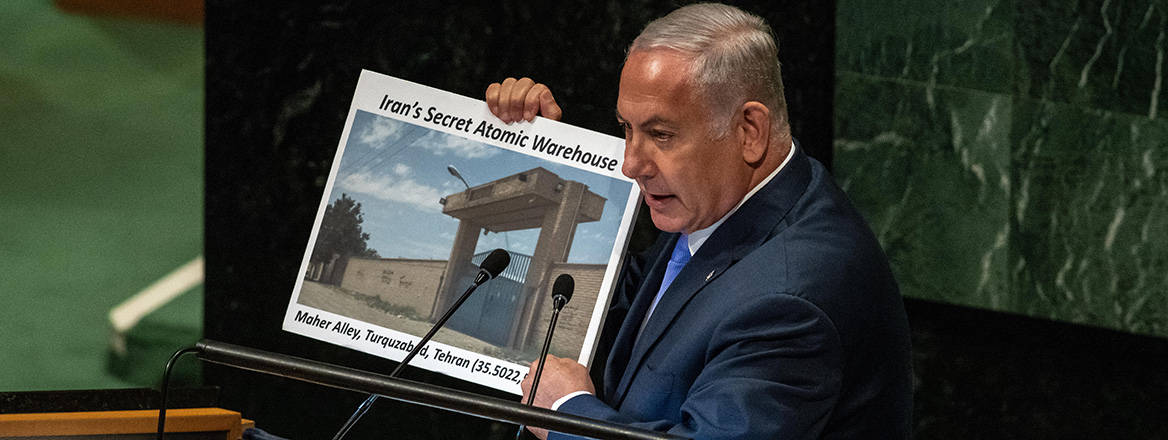Israel and Iran are Edging Closer to Direct Confrontation
While the Middle East has seen some major developments recently on the diplomatic front, the ‘shadow war’ between Israel and Iran has continued to intensify. The Israeli government needs to take account of the changing strategic situation and recalibrate accordingly.
In its approach to Iran, Israel has committed the mortal strategic sin of assessing a dynamic situation as a static one, and as a result has found itself surprised by and unprepared for recent developments – among them the rapprochement between Saudi Arabia and Iran; the apparent progress in negotiations between Washington and Tehran over the latter’s nuclear programme; and the readmission of Syria to the Arab League, a move that that has given President Bashar al-Assad renewed legitimacy. These developments have undermined many of the working assumptions of Israeli decision-makers, and should force them to reconsider their regional strategy, including the need to move beyond recent bold and threatening statements and military signalling towards Iran and Hezbollah.
Until fairly recently, those in charge of Israel’s intelligence assessment and strategic planning felt very confident that their perception of the danger emanating from Tehran – be it military, nuclear or conventional, or political – was not only shared by the international community close and far, but defined stable and reliable fault lines of alliances and enmities. Hence, it was believed that Israel could rely, for instance, on the Gulf states and the US for their complete cooperation in containing Iran’s destabilising activities in the region, and in preventing it from acquiring nuclear military capabilities. Recent events, however, have demonstrated that this was merely wishful thinking, and misjudged both the complex relations between Iran and other countries in the region and the ability of the regime in Tehran to exploit international developments to its advantage.
In one of his previous stints in office, Israeli Prime Minister Benjamin Netanyahu made one of his most damaging miscalculations by objecting to the 2015 nuclear agreement (the Joint Comprehensive Plan of Action, or JCPOA). Admittedly, by no stretch of the imagination was the JCPOA a panacea for preventing Iran from enriching uranium or from being a major regional and international strategic challenge, and it was most definitely not a transformational moment of engagement between Iran and the international community. Nevertheless, the ill-conceived withdrawal from the agreement by the Trump administration in the US, with a strong tailwind from Netanyahu, ended in Iran moving closer than ever to becoming a nuclear power, should it wish to cross that threshold. Since the now-defunct JCPOA was abandoned by Washington, Iran has amassed a uranium stockpile that is 21 times above the limits imposed by the 2015 nuclear deal, and it is continuing to install advanced centrifuges. In January 2023, inspectors from the UN nuclear watchdog – the International Atomic Energy Agency – detected particles enriched to 83.7% purity, which is almost at the weapons-grade level of 90%. In other words, Iran is closer than ever to an atomic bomb, should it choose to embark on that path. Negotiations – although indirect – between Washington and Tehran continue, and are rumoured to be making some progress, but this time Israel does not have the ability to influence the current US administration because of the anti-democratic inclinations of the Israeli government and its harmful approach to the Palestinian issue, and the resulting tension in relations between the two countries. Moreover, there is a recognition in Washington that the two countries’ approaches to preventing a nuclear Iran are far from being identical.
Israel has misjudged both the complex relations between Iran and other countries in the region and Tehran's ability to exploit international developments to its advantage
However, it is not only the nuclear issue that concerns Israel. For quite some time now, it has seen an Iranian presence close to its borders wherever it turns its head. In Syria, Lebanon and the occupied Palestinian territories, there is a strong Iranian presence to one degree or another. This has led Israel to adopt a strategy known as the war-between-wars against Iran in different parts of the region – close to its borders and well beyond – which is aimed at taking preventative actions, mainly covert ones. The aim is to either prevent or at least delay a full-scale war, or to reduce its destructive consequences should one break out. There are many facets to this shadow war between the two countries, with an increasing danger that it might lead to actual and direct hostilities. Israel’s objective is to slow down the Iranian nuclear programme and its ability to pose a threat directly or by proxy – for instance, by assassinating key scientists or through cyber attacks – in addition to daily confrontation in other arenas. Earlier this year, it was reported that an Israeli attack destroyed hundreds of Iranian drones at a military site in the Iranian city of Isfahan. Air raids in Syria targeting convoy and storage facilities for sophisticated weapons being sent to Hezbollah are a frequent occurrence. At the same time, Iran attacks tankers owned by Israeli businesses and targets Israelis travelling or living abroad. Until the war in Ukraine, Israel’s freedom to conduct aerial operations in Syria was dependent on Moscow’s goodwill, or at least its readiness to turn a blind eye. Since the invasion, however, Moscow’s attention has been focused on events closer to home, giving Israel a fairly free rein to operate in Syria – which it is taking full advantage of. Yet, Israel is also running the risk of miscalculating the Iranian response, as there are mounting political voices inside the country – especially originating from the Islamic Revolutionary Guard Corps – that are calling for a more pronounced retaliation in order to deter Israel from growing in confidence, which might end in it using military force against Iran’s nuclear installations.
It was not long ago that Israel, like other governments in the region and beyond, hoped that the widespread anti-hijab protests that erupted after the cruel death of Mahsa Amini – a young woman stopped and murdered by Iran’s morality police for allegedly failing to fully cover her hair, hence defying the country’s strict dress code – would turn into a full-blown revolution.
Israel is not the only country that would like to contain and deter Iran, but its potential allies are finding it increasingly difficult to align with it
This has not happened, and despite growing malaise across the country as a result of the economic situation, governmental corruption and authoritarian oppression, the Iranian regime is unlikely to be overthrown anytime soon. Instead, Iran is consolidating its relationship with Russia and supporting the latter in its war in Ukraine, much to the chagrin of the international community. Moreover, Tehran and Riyadh have resumed diplomatic relations, which may not have eliminated the deep suspicion and distrust between the two countries, but still threw a spanner in the works of Israel’s diplomacy and its belief that it could reach a quick normalisation of relations with Saudi Arabia in the vein of the Abraham Accords, without a fair and just solution to the Israeli-Palestinian conflict in accordance with the Saudi peace initiative of 2002.
The strategic environment that Israel operates in is changing and becoming more complex, and therefore requires an adequate response. So far, this response has mainly been more of the same: unequivocal warnings to Tehran and Hezbollah that Israel will not tolerate any military adventurism, whether it comes from Lebanon or Syria, and that it will respond to any attack with a massive retaliation. Israel is also aware of the military limitations it has when it comes to hurting Iran’s nuclear programme, and it will still need authorisation from the US for any such operation, which at this point in time is not forthcoming – especially not while the Israeli government is packed with ultra-nationalist-messianic members who are hellbent on weakening the country’s democracy and defying the international community by expanding the illegal settlements in the West Bank, entrenching the occupation and blockading Gaza. Israel is not the only country that would like to contain and deter Iran, but its potential allies are finding it increasingly difficult to align with it – at least openly – as long as the sixth Netanyahu government is in its current self-destructive mode. Yet for Israel, operating unilaterally might prove too costly.
The views expressed in this Commentary are the author’s, and do not represent those of RUSI or any other institution.
Have an idea for a Commentary you’d like to write for us? Send a short pitch to commentaries@rusi.org and we’ll get back to you if it fits into our research interests. Full guidelines for contributors can be found here.
WRITTEN BY
Yossi Mekelberg
- Jim McLeanMedia Relations Manager+44 (0)7917 373 069JimMc@rusi.org


